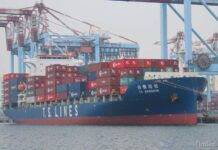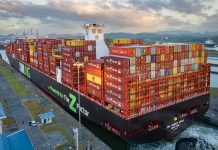
APM Terminals Elizabeth is thrilled to report significant strides in its US$5 million investment for the Electrification Pilot Project, made feasible by a generous US$1.4 million grant from the U.S. Environmental Protection Agency (EPA) under the Diesel Emissions Reduction Act (DERA).
This endeavour underscores APM Terminals’ unwavering dedication to sustainability and forward-looking innovation.
The DERA grant, geared towards curtailing diesel emissions and enhancing air quality, has facilitated the substitution of seven diesel terminal tractors with state-of-the-art Mafi T 230e Electric-Terminal-Tractors (eTTs).
“The project wouldn’t have been possible without the funding assistance and support from the U.S. Environmental Protection Agency. APM Terminals has set a goal to reach net zero in 2040 with one of the tools being the use of electric container handling equipment. Collaboration in this area is vital to accelerate the study, scale and adoption of standardized solutions that will ultimately reduce costs for the industry to decarbonize for the benefit of our customers and the environment,” stated Henrik Kristensen, managing director of APM Terminals Elizabeth.
These cutting-edge electric vehicles, equipped for both plug-in and wireless charging, boast zero direct emissions and diminished noise levels.
The terminal embarked on this pilot project in partnership with sustainability experts from the Leonardo Academy, a 501(c)3 nonprofit organization specializing in assisting entities in cultivating sustainable, impactful transportation strategies.
The pilot initiative will study critical performance and operational facets of employing electric trucks to gauge technological maturity and ensure operational preparedness for the terminal’s needs. The new eTTs will play a pivotal role in yard, rail, and vessel operations.
The terminal concluded the construction of its charging infrastructure in late 2023, paving the way for the deployment of the eTTs this spring.
The terminal has erected nine Heliox level 3 60-180 kW fast charging stations. In a groundbreaking move for the terminal industry along the U.S. East Coast, the installation also encompasses an InductEV wireless level 3 150 kW fast charging station, enabling trucks to recharge simply by parking over a charging pad. With just two hours of charging, the eTTs can operate for 16-20 hours.
Moreover, the power used to charge these electric terminal tractors is procured from 100% renewable energy sources through a power purchase agreement.
“With full utilization, each electric terminal tractor saves up to 1,100 tons of greenhouse gas generation annually and eliminates harmful particulate pollution. Cleaner vehicles mean cleaner air for the community,” added Jennifer Murphey, head of Project Management for APM Terminals Elizabeth.




